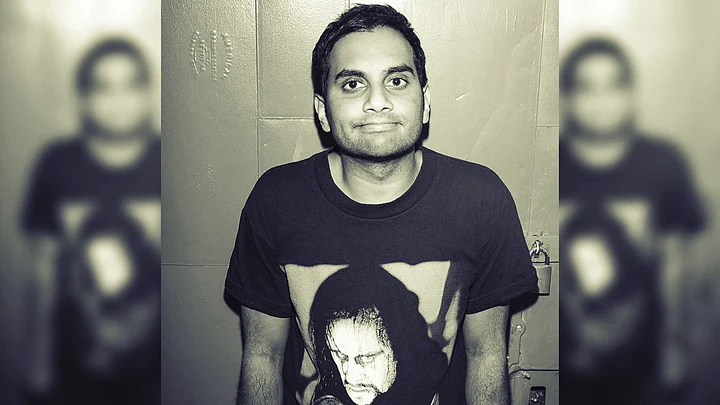Dressed in a Metallica t-shirt, Aziz Ansari crosses the street as the melancholy ‘Pale Blue Eyes’ by The Velvet Underground plays in the background. He tentatively pokes his head through a door backstage at the Brooklyn Academy of Music before heading inside. This is Aziz Ansari, right now, trying to find his way back to an audience he nearly lost after allegations of sexual misconduct surfaced last year.
Too busy to read? Listen to this instead:
An article published in January 2018 by the now defunct website Babe.net detailed a 23-year-old Brooklyn photographer’s date with Ansari during which she claimed his persistent sexual advances made her uncomfortable. An assortment of reactions followed as fans grappled with the fact that perhaps Ansari, the man who claimed to get it in his stand-up, his Netflix show Master of None and even a book on modern love, was one of the “creepy dudes” he referred to in his 2015 special at Madison Square Garden. Some called for him to be cancelled. Others decided that while his actions were unacceptable, they weren’t as egregious as that of other powerful, predatory men, like Louis CK or Harvey Weinstein, who had been outed during the #MeToo movement. But most could agree that whether he crossed a line or not, bad sexual experiences were still an issue that needed addressing.
Directed by Spike Jonze, Aziz Ansari’s latest Netflix special – Aziz Ansari: Right Now – marks a sort of halfway point between pre-#MeToo Aziz and what happens next.
Directed by Spike Jonze, Aziz Ansari’s latest Netflix special – Aziz Ansari: Right Now – was filmed during his recent international tour, and marks a sort of halfway point between pre-#MeToo Aziz and what happens next. The comedian oscillates between his usual animated, almost cartoon-like self and a quieter, more reflective tone during the special, his first since the #MeToo accusations cropped up. The camera stays close to Ansari, occasionally panning to close-up shots of the audience, giving the special an intimate air – Aziz Ansari unplugged, if you will.
The comedian opens with a joke about the allegations and being mistaken for Hasan Minhaj before addressing the elephant in the room head on. “There are times I felt scared, there are times I felt humiliated, there are times I’ve felt embarrassed, but ultimately, I just felt terrible that this person felt this way,” he confesses in a low voice. What we’re supposed to take away from this well-rehearsed speech is that the incident was “a step forward” and prompted not only Ansari to reflect on his actions but other men “think about every date that they had been on”.
How much of it is the real deal and how much is a carefully crafted attempt at a comeback is left for you to figure out.
Over the course of Aziz Ansari: Right Now, Ansari does his job as a comedian and holds a mirror to his audience – he’s in his element when taking on racism and the hypocrisy of “newly woke” white people (Things don’t just become racist when white people figure it out!). But how much of it is the real deal and how much is a carefully crafted attempt at a comeback is left for you to figure out. When he takes on armchair philosophers on the Internet “trying to out-woke each other” with think pieces about think pieces, it’s hard not to see it as a slight at the aftermath of his #MeToo allegations. He poses a pertinent question when he uses R Kelly and Michael Jackson for examples, employing nimble crowd work to poll the audience about where they draw the line when separating the art from the artist. But it’s hard not to also see it as a subtle suggestion that, when compared to them, his actions were far less heinous.
Questionable as the intentions behind this bit may be, Ansari doesn’t sermonise. He calls out his audience on their hypocrisy but never chastises them. Rather, by also referring to past work that may not have aged well, he appears to imply that just like them he too is trying to figure out our rapidly changing cultural mores – he is a work in progress. “We’re all sh*tty people,” he declares. “We have our blindspots but we become aware and slowly get better – we’re all on a journey,” he says.
Towards the end of the show, Ansari reminds the audience that by showing up “just to hear me talk into a microphone for like an hour or so,” they are complicit in his journey and says he is grateful to have earned their time. “That old Aziz is dead!” he announces. By stepping back and examining the messiness of living in a world with “2019 eyes” Ansari gives you the impression he has made an attempt at self-reflection. Whether it was a sincere one and he is now a less “sh*tty person” for it remains to be seen.
(At The Quint, we question everything. Play an active role in shaping our journalism by becoming a member today.)
